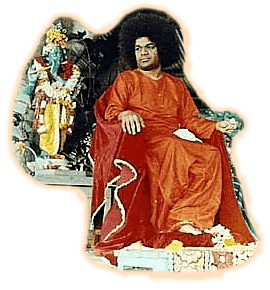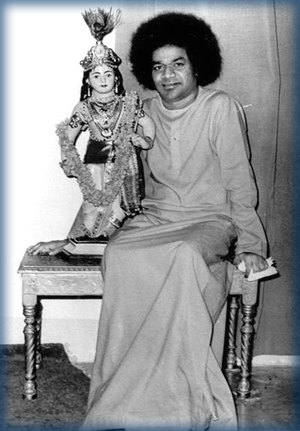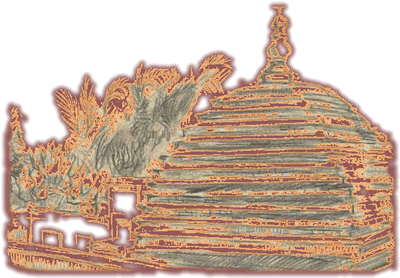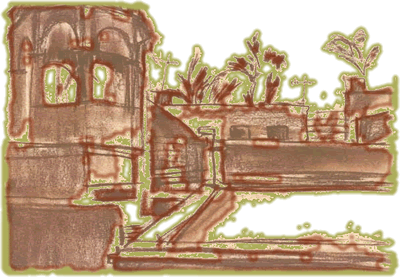|
Other Baba-books
|
||||||||
 |
The original
Sanskrit verses and with comments taken from the writings of
|
|||||||
|
'Brahmaanandam
Parama Sukhadam, Kevalam Jnaana Moortim Ever blissful,
granting happiness, embodiment of wisdom,
1 2a 2b 3 4 5 6 7 8 9 10 11 12 13 14 15 16 17 18a 18b
While the phenomenal
world is subject to change and decay, the divine reality is
indestructible. Akshara (imperishable, indestructable)
symbolizes the indestructible divine reality. All religious traditions
proclaim that God, the manifestation of akshara, is eternal,
and people of all faiths accept this idea. The so-called theological
differences are not really fundamental. Aum is the primordial akshara
and all the other letters are its derivatives. The divine letter Aum
represents the Parabrahman. The comprehension of the essence of
the Parabrahman is known as Brahmavidya or the
knowledge of Brahman. That is why the eighth chapter of the
Bhagavad Gītā has been given the title of akshara parabrahma yoga.
- Summer Showers in Brindavan
1979, p. 120
" Listen to this chapter sung! " " Listen to this spoken
chapter in Audio " arjuna uvāca adhiyaj˝ah
katham ko 'tra śrī
bhagavān uvāca "Arjuna! aksharam-brahma
paramam... Brahman is referred to as the akshara that is param.
Akshara means without kshara or destruction,
indestructible. Brahman comes from a root that means big, vast,
etc. How vast, you may ask. Vaster than whatever you call vast, that is
the answer. The word akshara has another meaning also. It means
omnipresent, immanent everywhere. Brahmam is not mere aksharam,
as you will have noticed. It is param aksharam. What does that
mean? It is that type of akshara that is beyond the reach of
time and space and knowability; it cannot be known by any or all the
categories; it never declines or ends; it is param aksharam,
the Highest Indestructible, Indescribable." - Gītā Vahini, pp. 117-8 "Now for a second point:
It is Brahman that dwells in everybody in the form of 'I'. In
fact, everybody hangs around this entity called 'I'. In the body, each
part and organ in the organization performs one chief task. Each sense
contacts and informs about one particular set of impressions from the
outer world. But though related to the senses, there is an 'I' shining
in the body, above and behind all of them. If that relationship is
broken, everything becomes inert material! When
the
I-power
flows through the senses, they are able to carry on their
allotted tasks. That power is Adyatma; it cannot be known
without great effort. Use the sharpest discrimination and you know it
to some extent. Brahman is the tat entity; Adyatma
is the tvam entity. To make the matter clearer to you, take
these two as appearance and character, form and substance. Brahman
is the form, Adyatma is the substance", said Krishna. - Gītā Vahini, pp. 118-9 Then Arjuna prayed that
the third subject, karma, may be fully explained to him. Krishna
was quite ready to oblige him. He began, "Arjuna! The limitation that
is necessary for the creation, fostering and destruction of beings is
what is called karma. The moveable and the immovable, all are
beings; why, the very act of the very resolution for creation is karma,
the
very
first; which still activates all everywhere - this entire
universe and all the movements and agitations and activities in it are
the direct consequence of primal karma, My sankalpa.
And as long as My resolution lasts, the stream of karma will
flow along. It can never go dry, as long as I do not will it. All that
you do is to get drawn into this flood; why, you are but currents in
this rush, or ripples or waves. My will has prompted all karma,
so karma done in consonance with My will becomes a part of Me." - Gītā Vahini, pp. 122-3 adhibhūtam
ksaro bhāvah "My
apparel,
which
I willed and folded around Me, became akasa (sky,
space, ether), the akasa got transformed into vayu (wind,
air),
the
vayu changed into agni (fire element), the
agni
into jala (water), the jala became prithvi or
earth, the earth grew grains of food, the food developed into the body!
So, it is clear, is it not, that the deha (body) too is Myself?
Why doubt this? "Therefore,
I
am
adhibhūtam (whole perishable creation; the
primordial form
of matter; everything that has name and form) also, as much as I am, as
I said before, brahman, adyatmam and karma. The cause
is the same as the effect; I am the primal cause and so, I am all these
effects also. I am the paramātmā; the rest are all adhidaivam
(divinity or fate, the spiritual substratum of the
cosmos). In every physical citadel or body, the divine personality
named Hiranyagarbha (cosmic divine mind; cosmic womb; golden
egg first created by Brahman, from which all creation issued)
is immanent. Just as a man is served by his senses, the Hiranyagarbha
is served by the adhidaivas. "You
might
wonder
what the role of these adhidaivas is! They are
deities that serve the divine purpose; that is to say, the eye is
illumined by Sūrya (the sungod, the personification of the
order of the sun as known by nature, S.B. 5:22), the ear by the deities of
the quarters, Indra (the king of the heavenly planets; the king
of heaven) motivates the hand; these and other presiding deities are
the senses of Hiranyagarbha. However great a sadhaka
might be, whatever eminence he might have reached, he can attain the
highest only through Hiranyagarbha. Hiranyagarbha is
indeed Godhead; there is no distinction between the two. Is this clear,
Arjuna? I am as much Adhidaivam as I am Adhibhutam; as
much these two, as I am Brahman, Adhyatmam and Karma.
They are all fully divine. "Now
for
the
next entity: Adhiyaj˝am (pertaining to sacrificial
aspects). That is also Me! This is the entity that consumes joy
and grief, the result of the multifarious karmas they have engaged in.
I am the recipient of the sabda (sound), sparsa (touch,
contact),
rūpa (form, figure, appearance), rasa
(taste,
sweetness, essence of enjoyment) and gandha (smell,
fragrance); through the five senses in all beings the adhiyaj˝a
principle! I am not only the kartha (doer, subject of action),
the entity responsible for the karma; I am also the bhoktha
(person who enjoys), the entity for which that karma
is gone through, the recipient of the fruits; I am the benefactor as
well as the beneficiary. -
Gītā
Vahini,
pp. 126-7 anta-kāle
ca mām eva "The fate of man after
death is molded by the thought that predominates at the moment of
death. That thought is the foundation on which the next birth is built.
Whoever at that time remembers Me attains My Glory, reaches Me in fact.
So each karma of man, every striving of his, every sādhana,
should be aimed at sanctifying that fateful moment; the years of his
life must be devoted to the discipline that will bring up at that
moment the thought of paramātmā or pranāva (AUM)." - Gītā Vahini, pp. 128 yam yam
vāpi smaran bhāvam "The
fate
of
man after death is molded by the thought that predominates in
the moment of death. That thought is the foundation on which the next
birth is built. -
Gītā
Vahini,
pp. 128 tasmāt
sarveshu kāleshu The
Gītā
teaches
the process of dhyana in a neat little formula: mām
anusmara yudhya ca! Keep Me in your memory and fight! The
cue, to fight the battle of life with God in the consciousness as the
charioteer is not merely a direction for Arjuna; it is a prescription
for all humanity. Fix your mind on Me, and fight! That is the
consummation of dhyana - identity, through the negation of
difference. -
Sathya Sai Speaks VII, p. 251 abhyāsa-yoga-yuktena Krishna
prescribed abhyāsa, practice ... Take the mind to God and keep
it there for a short time every day, morning and evening. God is so
merciful that He will come ten steps towards you, if you but take one
step towards Him. -
Sathya
Sai
Speaks VII, p. 288 kavim
purānam anuśāsitāram prayāna-kāle
manasā'calena ... all the eight descriptions
above have to be contemplated upon. That is the correct meditation of
the form of the Lord. Arjuna
asked,
"Krishna! Is such a meditation alone enough or has it to
be supplemented?" "Of course, when this meditation is practiced, care
should be taken to see that the mind is concentrated on that thing
only. It should not pursue diverse objectives. It must attach itself to
that One Supreme, with love and devotion, prema and bhakti.
Usually,
man's
love gets fastened on trifling temporary things and so
gets entangled in setbacks and sorrows. So the love has to be withdrawn
from such objects and centered on the Lord." - Gītā Vahini, pp. 137-8 yad
aksharam veda-vido vadanti sarva-dvārāni
samyamya om ity
ekāksharam brahma- "...
Control the senses, let the mind be effaced as much
as possible and let the heart be purified, let the vital airs be
uplifted into the sirsha (head), let the individual be
established in the atmic truth, and let the pranāva [Om(kāra)
or AUM] be the only point of attention at the moment of the prāna
leaving the body - such a one comes to Me and joins with Me; His mental
activities become the same as Mine", said Krishna. [see also S.B. 11:14-35] Here,
readers
should
fix their attention on what the Lord told Arjuna. The
Lord spoke of the control of the senses, not their destruction. Control
means: under one's behests, obedient to the will. Destruction means:
denial of activity, full inaction. The Lord also said of all the
senses, not of anyone or two only. Man must keep all senses under his
control and use them only when the purposes for which they have been
devised are to be fulfilled. They should not be let loose just because
one has them. Give them the functions they are designed for, but do not
allow them to master you and ruin you. Let them work strictly on
regulated lines. That is the Lord's intention. - Gītā Vahini, pp. 138 ananya-cetāh
satatam Whoever
is
busy
with no other thoughts than those about Me, whoever is ever
remembering Me, he certainly will release his dying breath through the
center of the head; he will attain Me. I am as near him, as he is near
Me. My dear Arjuna! How can I forget him who never forgets Me?
Forgetting is a human frailty, not the characteristic of God, let Me
tell you! ... I only ask, that your mind be fixed on Me. Devote your
mind to Me, dedicate it to Me, that is alI I ask for. - Gītā Vahini, pp. 142 mām upetya
punar janma "The
mahātmā ('great soul'; he who is perfectly
convinced that Krishna is all and is therefore surrendered to Him fully
absorbed in devotional service to the Lord) is free from all dual
experience. He is above and beyond. He has released himself from
identity with the particularized; he is in the universal, the eternal,
the changeless, the Brahma-bhava (absorbed in Brahman), not the
jīva-bhava (body oriented). He knows that the ātmā
is not a limited entity; he feels that it extends beyond all limits; he
is free from the blemish of tamas and rajas; he is
neither dull nor driven about by desire; he has pure consciousness,
unaffected by attachment or hate. Many who style themselves as such
nowadays, have no purity in their hearts, their consciousness is soiled
by foulness. But the pure in heart have no further birth and death.
They are under no obligation to appear again on earth. Without
attaining that purity, you cannot escape the round of birth and death,
however many your meritorious deeds, however high your spiritual
status, however glorious the heaven you have secured! Only those who
are perpetually in that Brahma-bhava can attain this Timeless
Me and be freed from the chain, by merging in Me." - Gītā Vahini, pp. 143-4 ā-brahma-bhuvanāl
lokāh At
this
Arjuna
gave expression to another doubt that worried him. He
asked, "If that is so, why do the Upanishads declare that those who reach
the heaven, Brahmaloka (the abode of Lord Brahmā), need not be
born again? Please make clear who exactly are those that are freed from
this cycle of birth and death?" "Arjuna!
There
are
two types of liberation mentioned in the Upanishads: sadyo-mukti
(instantaneous liberation) and krama-mukti (liberation in
stages, progressive emancipation). Sadyo-mukti is also referred
to as kaivalya-mukti (absolute unity with the Supreme; final
emancipation). For earning this, no one need aspire for any
heaven. They get this on the spot, and not by stages, step by step.
Liberation secured thus is a possession forever. The rest are liable to
change. When the effect of the merit acquired wears out, heaven has to
be given up, and life on earth starts anew. Such souls know no merging;
only those who attain kaivalya, merge and become one with the
eternal, the universal." - Gītā Vahini, pp. 144 sahasra-yuga-paryantam avyaktād
vyaktayah sarvāh bhūta-grāmah
sa
evāyam paras
tasmāt tu bhāvo 'nyo Krishna
answered,
"Pārtha! (son of Prithā (Kuntī), Arjuna's mother)
There is a state that knows no decline, beyond all these heavens. There
are many roads by which that state can be won. Unaware of these roads
or of the joy of that state, man is taking to others that are either
crooked or comfortable. He does not know how to distinguish between the
right road and the wrong." - Gītā Vahini, pp. 145 avyakto
'kshara ity uktas purushah sa
parah pārtha It
is God's word that if you have devotion to God, He will look after your
future. He will look after all the welfare that is due you. Yes so did
the Lord say in the Gītā. But when would this be? He said that
this would be done provided the devotee spends all his time in the
thought of God, provided he accepts God to be all pervading and as
present in every being. - Summer Showers in Brindavan 1972, p. 105 yatra kāle
tv anāvrittim agnir
jyotir ahah śuklah "Uttarāyana
(northward path of the sun) is the period when no dot of cloud or whiff
of fog contaminates the vast dome and the sun shines in all His glory.
This is the gross meaning; but there is a subtle one, too. The heart is
the inner sky. There, the sun that shines is buddhi or
intelligence. When the clouds of ignorance, the fog of egotism and the
smoke of attachment hover in that inner sky, the sun of intelligence is
hidden and things look murky and are mistaken. Uttarāyana of
the heart is when the inner sky is clear of all these, and when the sun
shines in full splendor. You have heard the expression, j˝āna-bhaskara,
'The sun is wisdom or Sun of spiritual wisdom' . The
sun is always associated with wisdom and intelligence. When a person
passes away with this equipment of the effulgent sun of wisdom in his
clear heart, he can certainly escape rebirth! He takes the path of Agni,
the
Archi-rādi-marga path, (path of Gods, beginning
with fire
or the Sun's rays, taken by spiritual souls after death) as said
already, and merges with Brahman!" - Gītā Vahini, pp. 150 dhūmo
rātris tathā krishnah "Those
who
pass
away in the other half of the year, the dakshināyana
(when the sun passes on the southern side), have the opposite destiny;
then the heart is beset with smoke and fog and cloud. The sun is hidden
and His effulgence has no splendor. And in the dark half of the month
the moon wanes, symbolizing the waning of Godward thought. The new moon
night is enveloped in complete darkness, all spiritual impulses suffer
defeat. The thick smoke of aj˝āna lies heavily on the mind.
This is the meaning of the expression Krishna-paksha. (Dark
half of month, when the moon is diminishing).Those who die at such an
inauspicious time reap an inauspicious result." - Gītā Vahini, pp. 150 śukla-krishne
gatī
hy
ete "Since
the
uttarāyana-marga is lit by the holy splendor of j˝āna,
it
is
praised as the sukla-marga or the white path. The dakshināyana-marga
is dark, filled with tamas
and aj˝āna; so it is called the dark path of the Krishna-marga.
Those
who
discard the body and journey on the uttarāyana move
along the white path and reach the stage of liberation or moksha,
which
is
devoid of delusion, which is the seat and source of Brahmananda,
from which there is no return to this world of name and form, this
arena of embodied beings. Those who leave the body during the dakshināyana
and move along the dark path, have to bear again this physical
encasement called deha, subject to birth and death. "Uttarāyana
is not so much a period of time; it is a state of mind. Those who
discard the body with the glory of self-knowledge move along the uttarāyana-marga
and those who die in ignorance of their atmic reality move along the pitri-yana
(path of ancestors, through which the soul ascends to
the lunar world to enjoy the benefits of ritual works), or dakshināyana
or the dark path." -
Gītā
Vahini,
pp. 151 naite sritī
pārtha jānan vedeshu
yaj˝eshu tapahsu caiva The
end
of
everything that is born is death; sam-yoga (union) leads
to vi-yoga (seperation); construction must result in the
destruction of that which was constructed. It is the law of nature that
birth ends in death and death leads to birth. The stage that knows no
coming and going is the stage when the Universal Brahman is visualized,
for since Brahman is all-pervasive, where is the other place from which
the "coming" can be effected and to which the "going" can be performed?
-
Gītā Vahini, pp. 152
|
||||||||






